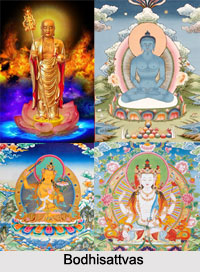 Bodhisattvas are the term in Sanskrit language and it is one of the major phases in Mahanayana Buddhism. It means that anyone who, motivated by great compassion, has generated Bodhicitta. It is a spontaneous wish to attain Buddhahood for the benefit of all sentient beings.
Bodhisattvas are the term in Sanskrit language and it is one of the major phases in Mahanayana Buddhism. It means that anyone who, motivated by great compassion, has generated Bodhicitta. It is a spontaneous wish to attain Buddhahood for the benefit of all sentient beings.
Term of Bodhisattvas
The term Bodhisattva literally means "Essence of Bodhi". A Bodhisattva takes the vow not to enter into Nirvana until and unless all sentiments have been achieved to complete "Buddhahood".
Referring of Bodhisattvas
A bodhisattva refers to living in an enlightened state. It may also refer to the person (enlightened being). In Buddhism this word was first used by Buddha. He referred to himself before attaining enlightenment. Hence in Buddhism this word indicates to one who will definitely achieve enlightenment. The word Bodhisattva can be found in the early Pali scriptures. While in Theravada Buddhism the Bodhisattvas are said to be the maitreyas in Mahayana sect they are the good Samaritans who can help the laymen to escape the pain and suffering of this world.
Stages of Bodhisattvas
 Bodhisattvas have to go through ten stages or bhumis in order to attain Enlightenment.
Bodhisattvas have to go through ten stages or bhumis in order to attain Enlightenment.
Stage 1: The perfection of giving - dana
Stage 2: The perfection of morality - sila
Stage 3: The perfection of patience - khanti
Stage 4: The perfection of vigor - viriya
Stage 5: The perfection of meditation - dhyana
Stage 6: The perfection of wisdom - prajna
Stage 7: The perfection of skill-in-means - upaya-kausalya
Stage 8: The perfection of aspiration - pranidhana
Stage 9: The perfection of power - bala
Stage10: The perfection of knowledge - jnana.
Grounds of Bodhisattvas
There are 10 grounds on which the Bodhisattvas have been classified in Mahayana Buddhism. Compassion or Karuna is a major concept in this sect. Mahayana school emphasizes that wisdom needs to be tempered with compassion. Avalokitesvara, Tara,
Manjushri, Samantabhadra, Ksitigarbha, Vajrapani are the major grounds of Bodhisattvas.
Aspects of Bodhisattva
The most important aspect of the Bodhisattvas is that they do their utmost to save the sentient beings from agony and misery. They never detach themselves from the Buddhist followers. Some of the bodhisattvas also refuse enlightenment without their followers. In Mahayana Buddhism, it is the duty of the Bodhisattva to help all beings on their conquest for the highest state of development. This type of motivation is known as Bodhicitta (`citta` means mind).




















